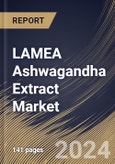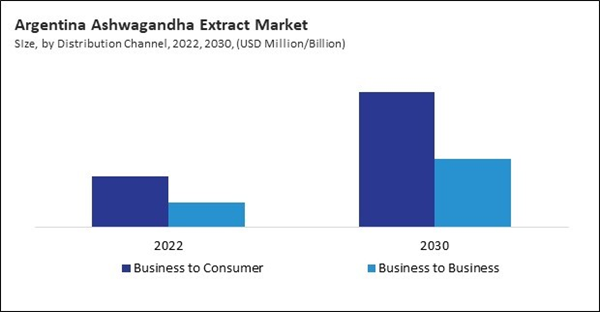In the market, powdered forms of Ashwagandha have emerged as a popular choice among consumers and manufacturers alike. Ashwagandha powder offers versatility in usage, enabling easy incorporation into various products such as dietary supplements, beverages, and functional foods. Its fine texture and neutral flavor make it ideal for blending into smoothies, shakes, and culinary recipes, providing a convenient way for consumers to reap the benefits of this herbal supplement. Therefore, the Brazil market utilized 266.03 thousand units of powdered forms in 2022.
The Brazil market dominated the LAMEA Ashwagandha Extract Market by Country in 2022, and would continue to be a dominant market till 2030; thereby, achieving a market value of $36.8 Million by 2030. The Argentina market is showcasing a CAGR of 13.2% during (2023 - 2030). Additionally, The UAE market would register a CAGR of 12.3% during (2023 - 2030).
Ashwagandha has been studied for its potential to improve cognitive function and memory. Products targeting cognitive enhancement may contain extract from among their ingredients. Athletes and fitness enthusiasts may use extract to improve physical performance, as some research suggests it may enhance strength and endurance. Ashwagandha’s calming properties make it a candidate for inclusion in supplements aimed at promoting relaxation and better sleep quality.
Ashwagandha has adaptogenic effects on hormones, potentially helping to balance cortisol levels and support overall hormonal health. This makes it a popular ingredient in supplements targeting hormonal balance, particularly for women. Ashwagandha may benefit digestive health, including relieving symptoms of indigestion and supporting gut health. In traditional Ayurvedic medicine, ashwagandha has been used as an aphrodisiac. Some modern supplements targeting sexual health and libido enhancement may include the extract.
As per the International Trade Administration, the United Arab Emirates leads the Gulf Cooperation Council in eCommerce sales, which surged by 53% in 2020 to a record $3.9 billion, or 10% of overall retail sales. The Dubai Chamber of Commerce and Industry signifies that eCommerce will develop $8 billion in sales by 2025 as the UAE region has nearly 100% internet and mobile phone penetration. E-commerce platforms offer convenience and accessibility, allowing consumers in the UAE to browse, purchase, and receive its products from the comfort of their homes. Thus, due to these aspects, the market will expand across the LAMEA region in upcoming years.
Based on the Distribution Channel, the market is segmented into Business to Consumer, and Business to Business. Based on Form, the market is segmented into Capsules/Tablets, Powder, and Others. Based on Application, the market is segmented into Dietary Supplements, Sports Nutrition, Food & Beverages, and Others. Based on countries, the market is segmented into Brazil, Argentina, UAE, Saudi Arabia, South Africa, Nigeria, and Rest of LAMEA.
List of Key Companies Profiled
- Kerry Group PLC
- Dabur India Ltd.
- Emami Limited
- The Procter and Gamble Company
- Patanjali Ayurved Limited
- Himalaya Wellness Company (Himalaya Global Holdings Ltd.)
- Shree Baidyanath Ayurved Bhawan Pvt. Ltd.
- Unilever PLC
- Taos Herb Company
- Kairali Ayurvedic Group
Market Report Segmentation
By Distribution Channel (Volume, Thousand Units, USD Billion, 2019-2030)- Business to Consumer
- Business to Business
- Capsules/Tablets
- Powder
- Others
- Dietary Supplements
- Sports Nutrition
- Food & Beverages
- Others
- Brazil
- Argentina
- UAE
- Saudi Arabia
- South Africa
- Nigeria
- Rest of LAMEA
Table of Contents
Companies Mentioned
- Kerry Group PLC
- Dabur India Ltd.
- Emami Limited
- The Procter and Gamble Company
- Patanjali Ayurved Limited
- Himalaya Wellness Company (Himalaya Global Holdings Ltd.)
- Shree Baidyanath Ayurved Bhawan Pvt. Ltd.
- Unilever PLC
- Taos Herb Company
- Kairali Ayurvedic Group









